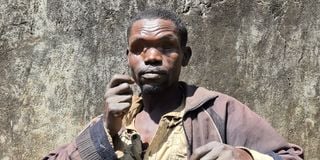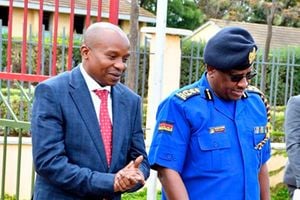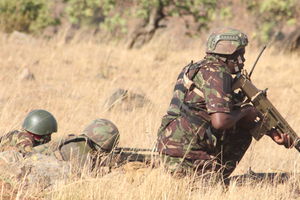
Peter Mwenda, a herder from Igembe North, who lost his sight after being shot by bandits. He lost 20 cattle in the attack.
Peter Mwenda, 45, sits pensively on a log at the home of his uncle in Kalimankware village, Mutuati sub-County, some 70 kilometres from Meru town.
When we walk in, he fumbles for his walking stick and removes the spectacles exposing the physical scars of cattle rustling, which has bedevilled the 640 square kilometre Nyambene grazing zone for years.
Located on the fringes of the grazing zone, Kalimankware, Tiiri and Mwanika villages have borne the brunt of cattle rustling.
For Mr Mwenda, one raid by bandits from the neighbouring Samburu County caused him huge losses — he lost his eyesight, all his 20 cattle, and ultimately his family after his wife deserted him due to his disability.
“On the fateful night, cattle raiders came to our village and were scouring every home for cattle. I was shot in the head and the bullet destroyed all my eye sockets. I had painstakingly raised the herd of 20 cattle which was stolen. After the attack that left me a bedridden pauper, my wife left. I now depend on my uncle,” Mr Mwenda recounts.
His father was killed by cattle raiders in the late 90s as he took care of his herd in the grazing area, pointing to the cycle of poverty created by the vice.
Mr Mwenda’s uncle, Isaiah Kinyua, has also suffered heavily at the hands of cattle rustlers.
“Last year, the raiders stole 25 cattle and 18 goats. My home has been raided five times since I started keeping cattle. The only time we got some reprieve was when President Mwai Kibaki took office,” Mr Kinyua says.

Julia Kanini and Pauline Nkatha at the grave of their late husband Joel Baariu, a police reservist. He was killed by bandits in the Meru grazing zone.
He says it is possible to end the runaway banditry if the presidency stamps its authority across the country.
But the scars of the battle for livestock do not live with the herders only, police reservists — who are frontline responders whenever an attack happens — have tales to tell.
The family of police reservist, Joel Baariu, vividly remembers the events of September 19 this year when he was killed.
Ms Julia Kanini, who was Baariu’s first wife, says her husband had served as a police reservist for 10 years and had risen to the rank of commander.
“Whenever bandits were spotted, he would receive a call and mobilise other reservists for a response. He would jump onto a motorbike and go into battle,” she recounts.
Ms Pauline Nkatha, who was the second wife, says on the fateful day, Baariu went to pursue stolen cattle as usual.
Government support
“They left one evening and by the next evening, he had not returned. We later learnt that they were ambushed by bandits and he was shot. He died in the bushes because there was no emergency response,” Ms Nkatha says.
Her six children, some in university and secondary school, are not banking on government support after losing their breadwinner.
Mr Safari Kobia, a police reservist who is nursing a wound in the stomach, says he is alive thanks to timely evacuation by a friend.
“We were engaged in a gun battle with about 13 bandits who had stolen 200 animals at around 2pm. As the gunfight intensified, more bandits came from behind us and this is when I was shot.
“I fell into a ditch and were it not for a friend who came two hours later, I could have died. I’ve not received any help from the government yet I cannot work due to the injury,” Mr Kobia says.
Since last year, the Ministry of Interior has recruited more than 200 police reservists, some of whom have died in the line of duty while several others are nursing gunshot wounds.
“When we graduated from training in December last year, we encountered bandits on the first day. Since then, we have faced bandits several times, lost animals and recovered others,” a police reservist who spoke on condition of anonymity said.

Ms Julia Kanini, the widow of Julius Baariu, a police reservist who was shot dead in September this year, displays his photo.
The reservists say despite the increased deployment of officers, more needs to be done to counter cattle rustlers.
Armoured vehicles
He says when bandits strike at night, armoured vehicles are of no use since they can easily expose them.
“While each of us is armed with 40 bullets, bandits have an unlimited supply of ammo making the gun battle uneven. Bandits come in gangs of more than 20 and also have quick reinforcement arrangements when overwhelmed,” he says.
Meru County Peace and Conflict Resolution Committee Chairman Charles Kamwibua says despite several government interventions, including setting up 10 police camps, banditry continues unabated.
Mr Kamwibua says more than 6,800 cattle and 3,400 goats have been stolen since September last year. He also says over 20 people — including five police reservists — have died in the last year.
“Recently, we met the Inspector General of Police and gave vital leads on cattle rustling organisers. We are yet to see any arrests,” Mr Kamwibua said.
Meru County Commissioner Jacob Ouma admits that more needs to be done to improve the welfare of the reservists.
At the same time, a lobby group has asked the government to enhance security in Buuri. Imenti Development Forum raised concern over the failure of law enforcers to deal with banditry along the Meru-Isiolo border.
“We urge the government to protect residents of Maili Saba and Maili Nane,” Buuri IDF chapter chairman Mike Koome said.









